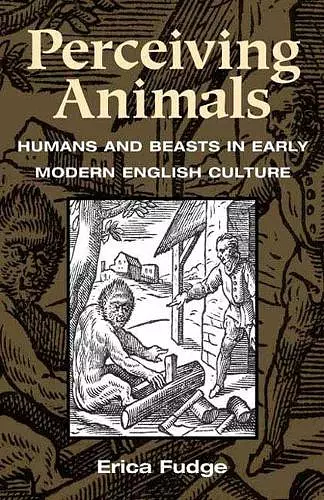Perceiving Animals
Humans and Beasts in Early Modern English Culture
Format:Paperback
Publisher:University of Illinois Press
Published:9th Jan '02
Currently unavailable, our supplier has not provided us a restock date

The boundaries between human and beast forged a rugged philosophical landscape across early modern England. Spectators gathered in London's Bear Garden to watch the callous and brutal baiting of animals. A wave of "new" scientists performed vivisections on live animals to learn more about the human body.
In Perceiving Animals, the British scholar Erica Fudge traces the dangers and problems of anthropocentrism in texts written from 1558 to 1649. Meticulous examinations of scientific, legal, political, literary, and religious writings offer unique and fascinating depictions of human perceptions about the natural world.
Views carried over from bestiaries--medieval treatises on animals--
posited animals as nonsentient beings whose merits were measured solely by what provisions they afforded humans: food, medicine, clothing, travel, labor, scientific knowledge. Without consciences or faith, animals were deemed far inferior to humans.
While writings from the period asserted an enormous biological superiority, Fudge contends actual human behavior and logic worked, sometimes accidentally, to close the alleged gap. In the Bear Garden, even a man of the lowest social rank had power over a tortured animal, sinking him, though, below the beasts. The beast fable itself fails to show a true understanding of animals, as it merely attributes human characteristics to beasts in an attempt to teach humanist ideals. Scholars and writers continually turned to the animal world for reflection. Despite this, scientists of the period used animals for empirical and medical knowledge, recognizing biological and spiritual similarities but refusing to renege human superiority.
Including an insightful reexamination of Ben Jonson's Volpone and fascinating looks at works by Francis Bacon, Edward Coke, and Richard Overton, among others, Fudge probes issues of animal ownership and biological and spiritual superiority in early modern England that resonate with philosophical quandaries still relevant in contemporary society.
"This innovative work uses animals to rethink humans and concepts of humanity in new and compelling ways, from the gripping first chapter, 'Screaming Monkeys,' to the metaphorical bull-baiting of the Epilogue. A stimulating and important addition to the cultural history of early modern England." -- Barry Reay, professor of history at the University of Auckland and author of Popular Cultures in England, 1550-1750
ISBN: 9780252070686
Dimensions: 216mm x 140mm x 20mm
Weight: 313g
248 pages